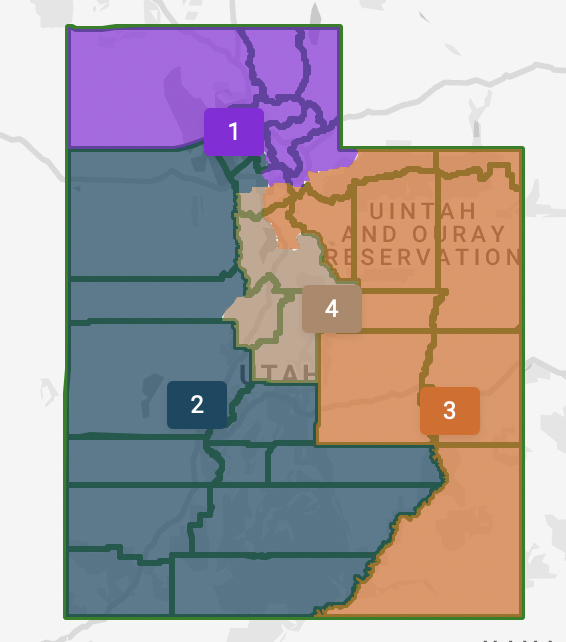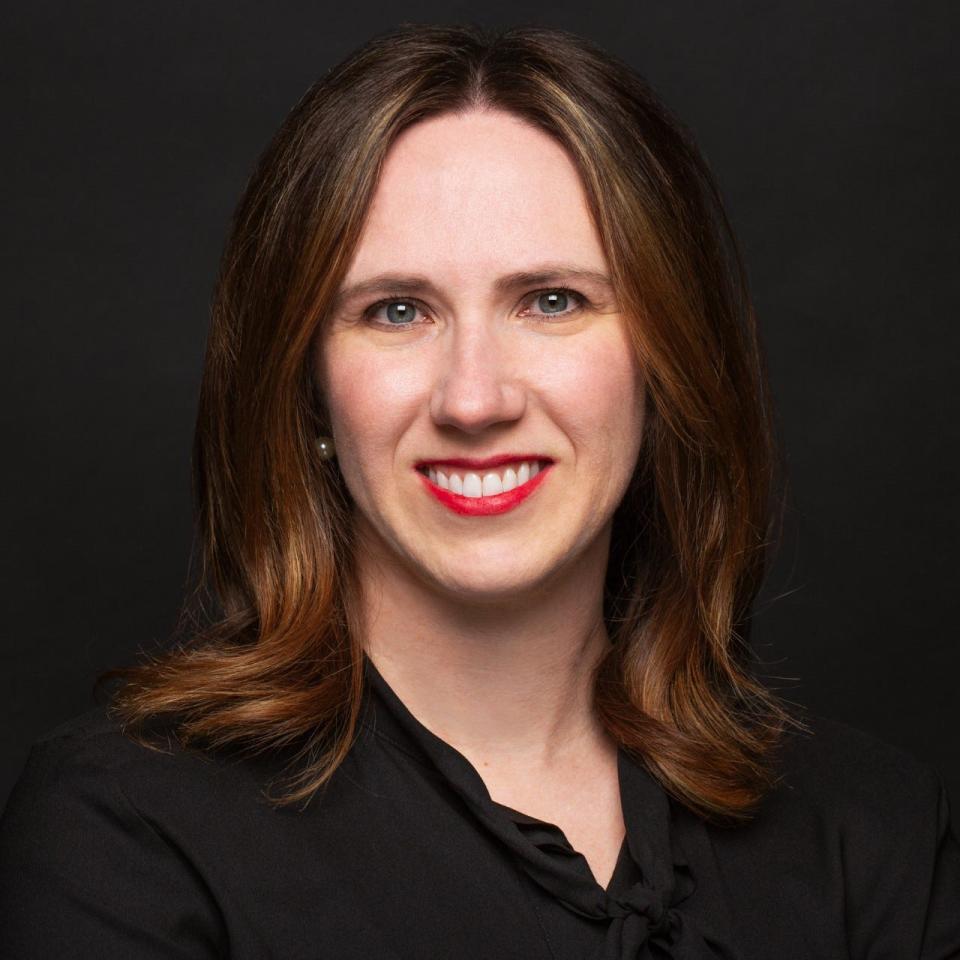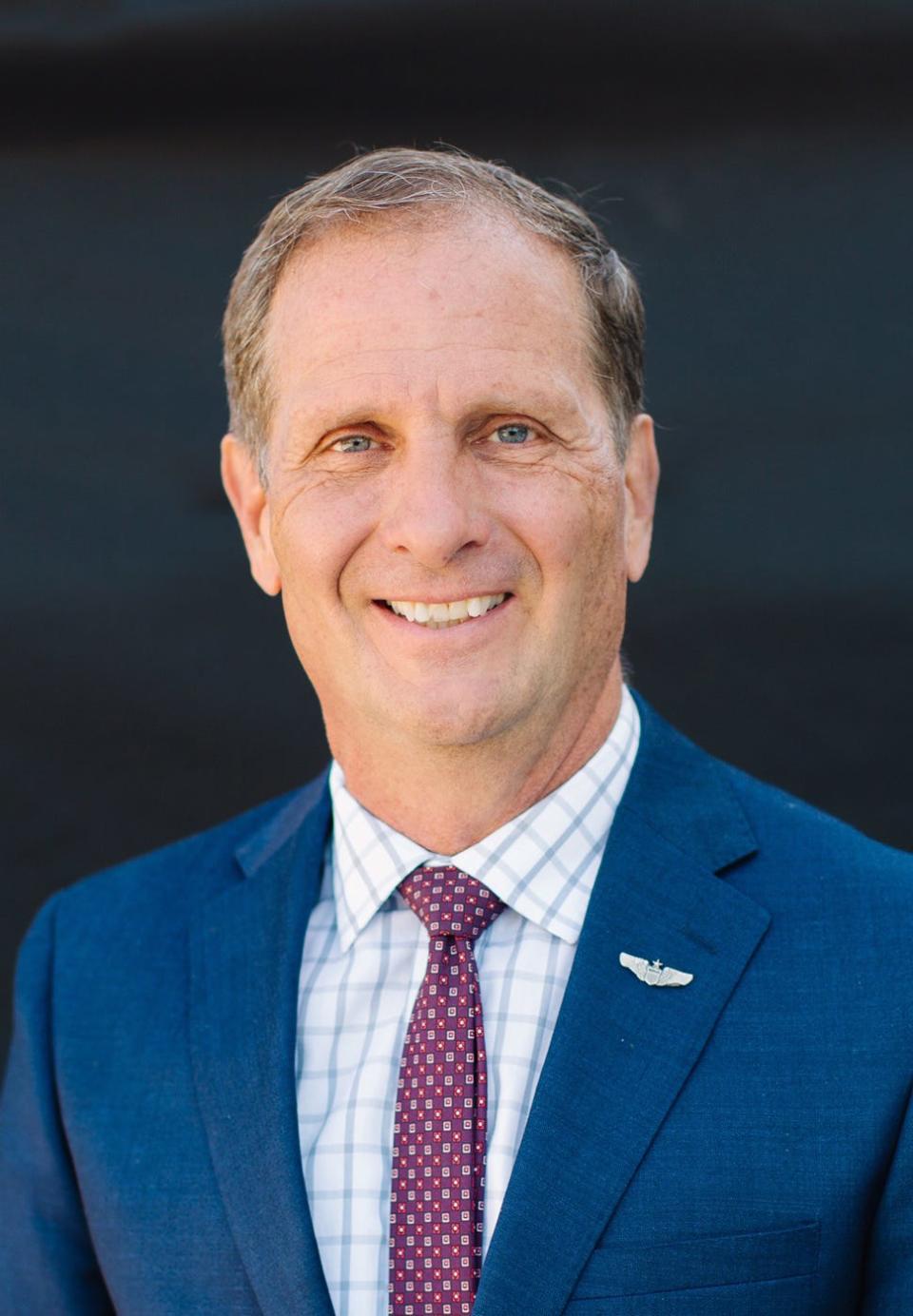2022 Primary Election Q&A: Chris Stewart and Erin Rider, candidates for Utah's 2nd District

Utah's 2nd Congressional District is set to hold its first Republican primary election in a decade on June 28.
This primary will be a face-off between the five-term incumbent, sitting U.S. Rep. Chris Stewart, and Erin Rider, a Salt Lake City-based attorney and former congressional staffer with the late U.S. Sen. Orrin Hatch.

Stewart was first elected to Congress in 2012. An Air Force veteran, before he was elected, Stewart was a best-selling author and CEO for the Shipley Group, a consulting firm on energy and the environment.
Rider is currently a corporate attorney focusing on mergers and acquisitions and was a law clerk for the Senate Finance Committee for Hatch.

The Spectrum sent these candidates a questionnaire to gauge their positions on topics relevant to southwest Utah. Here are their responses.
Water continues to be a scrutinized resource during this ongoing drought. What would you do as an elected official to protect this resource in the future?
Rider: Although many conservation efforts are best addressed at the local level, the federal delegation can still provide crucial support and assistance in ongoing projects and initiatives. This could include seeking out federal funding for new infrastructure projects, removing red tape to increase access to necessary permits, or facilitating negotiations at the federal or interstate level. If elected, I would work with local and state leaders to ensure that any roadblocks to such plans were removed and that any funding or approvals necessary were obtained. Additionally, in the next few years we will be renegotiating the Colorado River Compact, and it is imperative that we have an engaged, knowledgeable representative participating in those discussions to help ensure Utah does not lose access to crucial water resources.
Stewart: Water is a sacred resource in the West, and I believe we should be wise stewards of every drop. I firmly believe the best government is the one closest to the people. Through that lens, all water is owned by the State and best managed at the local level without federal interference. When federal funds have been required for large projects, I have been and am an advocate for those projects and help with land management agencies to secure the proper rights of way, conveyances, etc so that local water managers can develop, protect, and conserve their limited resources. For instance, Washington County is pursuing a major reuse/ secondary water system across the County, in conjunction with additional conservation, to better use every drop multiple times. This will require crossing federal land, likely federal funds, and most of the points of diversion are on federal land. I have been intimately involved in these planning efforts for years and will continue to provide federal help for local objectives when needed.
What needs to happen for Washington County if the Lake Powell Pipeline isn’t built?
Rider: Increased conservation and infrastructure initiatives should be one of the top priorities for both federal and local leaders right now. Even if the Lake Powell Pipeline is built, we should not cease investing in additional infrastructure projects and conservation initiatives. Washington County is one of the fastest-growing counties in the state right now, and we need to be building resources that will last us long into the future, in addition to addressing our current drought. As your Representative in Congress, I will make sure that access to resources needed to build and maintain such infrastructure projects is a top priority in Washington.
Stewart: No other federal representative has been as involved in the Lake Powell Pipeline as I have, and we continue to work on that goal. Washington County is unique in the nation for a population of that size being dependent on a single source of water (the Virgin River basin). The LPP is necessary for water redundancy but will take several more years as the Colorado River Compact is renegotiated. Until then, Washington County is taking every step to ensure they are the best stewards of every drop of water. Currently 60% of the water is used outside the home. A significant amount of water in the County is not potable without being cost prohibitive, but that water can be used in irrigation. A robust secondary and reuse water system is in development and needs to be completed including the infrastructure and multiple reservoirs to make the system effective and efficient. This will allow much more of the potable water to be used for residential and businesses, while using the non-potable water for irrigation to maintain the quality of life that makes the county so beautiful. That system, along with tighter conservation efforts, should bridge the gap until a redundant water source is brought to the area.
What are the most pressing issues for you for this election?
Rider: Inflation. If elected, I will advocate for sound, common-sense fiscal policy to fight rising inflation and reign in excessive government spending.
Smart energy policy and energy independence. I will support energy policies that put us back on the path to energy independence, continue to invest in new and cleaner energy sources, and ultimately lower fuel prices for Utah families.
Border security. I will work to fix our border crisis by supporting legislation that strengthens our border and simplifies the immigration and visa process.
Stewart: There are many — the rise of Socialism, ESG, the size of our national debt —but one of the greatest threats that touches on all the others is that no one knows what is true anymore. For so much of our informational content, truth has been traded for perception, opinion, and bias. It has become increasingly more difficult to discern fact from fiction.
How should nature conservation play into the development of southwest Utah?
Rider: We all love the beautiful outdoor landscapes Utah is famous for, and we all want to make sure that they are preserved and properly managed for future generations. In order to balance out practical growth with appropriate conservation, we need to make sure that local experts have a voice in conservation discussions happening in our wilderness areas. This means we need (1) better communication between the federal government and local officials, and (2) smart conservation plans that account both for the fragility of animal and plant species in the area, as well as practical growth and expansion. If elected, I intend to open multiple district offices in southwest Utah to facilitate better cross-collaboration between the federal government and local residents and ensure that local Utahns are involved in development and conservation discussions with federal agencies.
Stewart: Southwestern Utah is uniquely beautiful, which is obvious with so many visitors and a booming housing market. Those natural attractions should be conserved and protected for current enjoyment and for future generations. We must be good stewards of our surroundings, and we historically have been, which is what makes them so attractive still. We must balance resources with a growing population and economy, not allowing radical environmental agendas to prohibit economic growth. With wise planning, especially at the local level, we can protect the unique nature of the area, we can enjoy it, and we can allow for responsible growth in the future so that future generations may enjoy it as well.
Do you support the Northern Corridor being built through the Red Cliffs Conservation Area?
Rider: This is a decision best determined by local officials, and I will work with local leaders to support whichever path they decide is best for the community and stakeholders.
Stewart: I have been very involved in the development of the northern corridor at the request of local elected officials and transportation managers, and I support locally driven regional transportation goals including the northern corridor. The people of the nation, through their elected representatives in Congress, have spoken on this issue and declared in law that a route be designated. Unelected bureaucrats have continually thrown up literal roadblocks to this effort. The truth is that those environmentalists against the road are extremely myopic. The additional conservation lands of Zone 6, with the extremely high tortoise populations there, the way the corridor will be constructed with minimal habitat loss, is a major net benefit to the conservation of the tortoise. Without the road, the mitigation efforts are removed, the additional habitat no longer protected, and it will likely be developed.
What does ‘smart growth’ look like to you?
Rider: 'Smart growth' is growth that (1) is planned, with foresight for long-term ramifications and community needs, and (2) does not outpace existing resources. Utah is the fastest-growing state in the nation, which means there are enormous burdens placed on local communities to keep up with demand, without growing faster than our natural resources - like water - will allow. If elected, I will be an active partner with local governments to ensure they have the support and resources they need to create well thought out plans for Utah's continued growth and development.
Stewart: Smart growth is planned growth that precedes the demand rather than constantly playing catch up or reacting to foreseeable challenges. Smart growth anticipates needs and provides the power, water, transportation, infrastructure, education, job opportunities, etc to the market before the demand exceeds the supply. That form of planning and development maintains quality of life and also comes at a significantly reduced cost than reactionary growth which requires reconstructing infrastructure at a much greater expense.
How would you describe yourself politically?
Rider: I am and always have been a conservative Republican. I value conservative principles and believe they provide a solid foundation for strong families and communities. I am concerned that our current elected officials are currently spending more time pointing fingers at our political opponents than coming up with viable policy solutions to address the issues facing everyday Utahns and everyday Americans. I would like to see us return to the core conservative principles that made us great and lead out in actually solving the issues that plague this country today.
Stewart: I am a lifelong strong constitutional conservative. I believe that conservative principles best maximize personal freedom and responsibility and best produces limited, effective, and efficient government. I believe in adherence to the Constitution and the Bill of Rights, particularly the value of federalism. I believe that the best and most responsive government is the one closest to the people. America is unique and exceptional in the history of the world. While we continually strive to become a more perfect Union, we remain the last best hope on Earth. Conservative values will uphold the United States as the shining city on the hill, and other countries will continually look to America for leadership.
What could Republicans in Utah be doing better?
Rider: Republicans in Utah have a real opportunity to lead the nation in smart, conservative policy-making, but only if we have representatives in office who are fully engaged and working for the best interests of the state. District 2 is the fastest growing district in the fastest growing state in the country. We deserve to have an elected representative who can lead out by letting our creativity, ingenuity, and resourcefulness shine through, but we do not have that kind of leader in our current representative. We have all the tools necessary to be the party for all Americans — including women and minorities — but we need to show it by ending the constant finger-pointing and instead bringing our ideas to the table and getting things done.
Stewart: Republicans must remain confident in our belief that adherence to conservative values limits government and maximizes personal freedom and liberty. We must remember that shared values and objectives can still generate multiple possible paths to the same destination. We must resist the temptation to vilify fellow conservatives with differing strategies, while returning to the Reagan principle of the Big Tent, educating the new generations of the value of conservative principles and letting them know that there is a place for them in the GOP.
Should the government be doing more to create affordable housing? (Yes or No) What steps would you take around housing affordability if you are elected?
Rider: This is primarily a local issue and one what is best addressed by local elected officials and community leaders. The federal government should defer to local control, but can move forward with limiting restrictions and burdensome regulations that are slowing the supply chain.
Stewart: As previously stated, I believe the best government is the one closest to the people and that local government is the best to handle unique circumstances. Very few federal solutions will be as effective as local solutions on attainable housing. The proper role of the federal government is to ensure local planning have the necessary resources and elimination of restrictions that inhibit local solutions.
Was the 2020 election free and fair?
Rider: Yes. While there were many lessons to be learned from 2020, including the importance of continuing to improve our election integrity and security, Joe Biden won the election, and it is time for us, as Republicans, to turn our sights to the future instead of dwelling on the past.
Stewart: Many people have expressed to me their fear and frustration with the integrity of the 2020 election. I share some of those concerns and I am doing everything in my power to ensure election integrity is a national priority.
What is your opinion of the election certification process that happened on January 6-7, 2021, where 147 congressional members voted to object to certifying the results of the 2020 presidential election?
Rider: While each member of Congress has the right to object to a certification, it is deeply troubling that Chris Stewart has never been able to articulate the reasons why voted against the certification when so many of his colleagues - including Senator Mike Lee - could find no constitutional basis for an objection. I firmly believe that each state has the right to run their own elections process, and it was deeply concerning to me that Chris Stewart felt it appropriate to step into another state's certification process.
Stewart: In fact, 147 members did not object to certifying the election. The majority of the 147 were calling for a 30 day pause in certifying a single state because of constitutional concerns.
Sean Hemmersmeier covers local government, growth and development in Southwestern Utah. Follow on Twitter @seanhemmers34. Our work depends on subscribers so if you want more coverage on these issues you can subscribe here: http://www.thespectrum.com/subscribe.
This article originally appeared on St. George Spectrum & Daily News: 2022 Primary Election Q&A: Chris Stewart and Erin Rider

